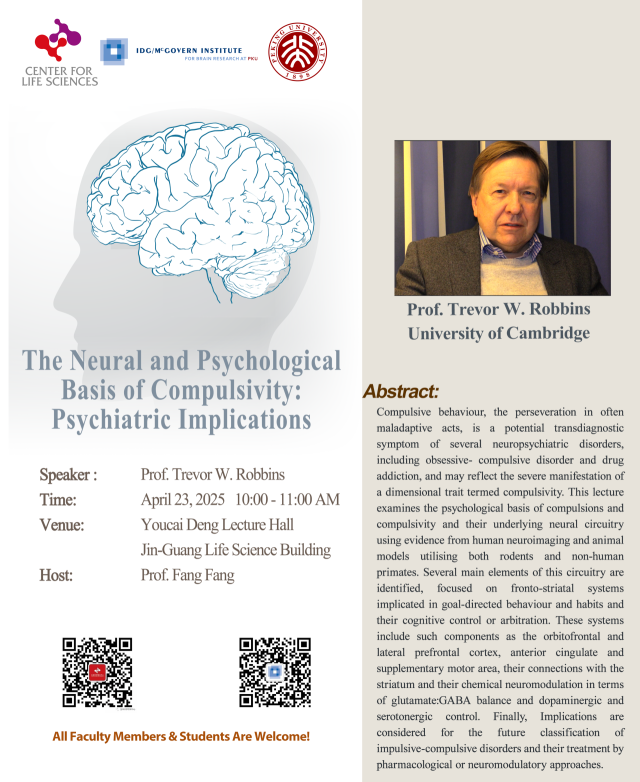Speaker:Prof. Trevor W. Robbins, Department of Psychology, University of Cambridge
Time: 10:00–11:00 AM, April 23, 2025
Venue:Youcai Deng Lecture Hall (#101), Jin-Guang Life Science Building
Host:Prof. Fang Fang
Abstract
Compulsive behaviour, the perseveration in often maladaptive acts, is a potential transdiagnostic symptom of several neuropsychiatric disorders, including obsessive- compulsive disorder and drug addiction, and may reflect the severe manifestation of a dimensional trait termed compulsivity. This lecture examines the psychological basis of compulsions and compulsivity and their underlying neural circuitry using evidence from human neuroimaging and animal models utilising both rodents and non-human primates. Several main elements of this circuitry are identified, focused on fronto-striatal systems implicated in goal-directed behaviour and habits and their cognitive control or arbitration. These systems include such components as the orbitofrontal and lateral prefrontal cortex, anterior cingulate and supplementary motor area, their connections with the striatum and their chemical neuromodulation in terms of glutamate:GABA balance and dopaminergic and serotonergic control. Finally, Implications are considered for the future classification of impulsive-compulsive disorders and their treatment by pharmacological or neuromodulatory approaches.
Bio
Trevor is Professor of Cognitive Neuroscience at the University of Cambridge from 1997, being based in Cambridge for most of his scientific career and receiving his PhD there in 1975. He was also Professor of Expt. Psychology and Head of the Dept. of Psychology (2002-2017). He is currently also a Professor at Fudan University (from 2018).
He is a Fellow of the British Psychological Society (1990), British Pharmacological Society (2017), Academy of Medical Sciences (2000), and Royal Society (2005). He has published nearly 1000 peer-reviewed articles, (H index 269, Google Scholar). He has co-edited ten books, most recently "The Frontal Cortex: Organization, Networks and Function" (with M Banich and SN Haber, MIT Press). He edits Psychopharmacology (since 1980) and is an editorial advisor for Science.
Trevor has directed the ‘Behavioural and Clinical Neuroscience Institute’ (founded in 2005) the mission of which is to enhance translation from basic to clinical neuroscience. In 1987, he co-invented the CANTAB computerized neuropsychological test battery, used in over 700 centres world-wide. He is especially interested in frontal lobe function, including cognitive flexibility and its neurochemical modulation, relevant to clinical disorders especially of impulsive-compulsive behaviour.
He received the Distinguished Scientific Contribution Award from the American Psychological Association (2011). In 2014 he shared the Brain Prize of the Grete Lundbeck European Brain Research Foundation, the most valuable in neuroscience, for his work on human mental disorders. He received Lifetime Achievement Awards from the British Association for Psychopharmacology (2015) and the British Psychological Society (2018). In 2016, he received the Robert Sommer Award for research into schizophrenia. In 2017 he received the Gold Medal of the Society for Biological Psychiatry (USA) and the Goldman-Rakic Award (from the Brain and the Behavior Foundation) for outstanding research in cognitive neuroscience. Trevor has been rated by Semantic Scholar as the "4th Most Influential Neuroscientist of the Modern Era". He received the William James Fellow Award of the Association for Psychological Science (2021) and the highest research rankings in both Psychology and Neuroscience according to res.com (2022).
https://research.com/scientists-rankings/neuroscience/psychology
He was made a CBE in the U.K. New Year’s Honours list. in 2012 "for services to medical research".

2025-04-10